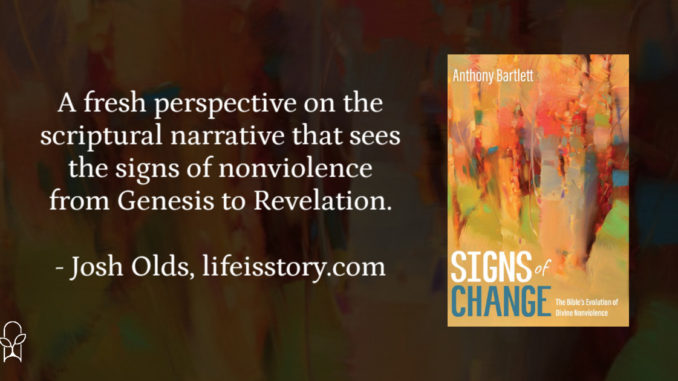
Published by Cascade Books on March 11, 2022
Genres: Academic, Non-Fiction
Buy on Amazon
Goodreads

The Bible has many stories, but really there are only two. There is a story of violent humanity, and there is the story of a self-giving, nonviolent God. The question has been how to distinguish the two without creating a toxic dualism. Bartlett shows that the narratives in tension are not two opposed Testaments, even less two metaphysical principles, but the slow separating out of nonviolent revelation from the frame of violent meaning by which human beings have always signified themselves and their gods. In his prior, ground-laying book, Theology Beyond Metaphysics, Bartlett demonstrated the concept of semiotic change and how it emerges as the most appropriate way of understanding and affirming a relational shift in human and theological meaning. In this present work, he supplies a rich seam of biblical evidence with gripping essays on Old Testament books and their evolution of transformative signs and new meaning. Accounts of the life of Jesus and the teaching of Paul make the change exponential, bringing to definitive expression the inbreaking of the nonviolent divine. Signs of Change creates a theological masterstroke, showing step-by-step how semiotic evolution leads human existence to the truly saving knowledge of a nonviolent God.
One of my key takeaways from this book, one that is rather tangential to the actual subject matter but crucial to an understanding of modern theology, is just how influential Augustine was and how his perspectives have simply been assumed in so many areas of modern thought. I open with this reflection because when I started this book on Christian non-violence I didn’t expect sentences like “We have inherited a broad semiotic Augustinianism, but with Girard’s irruptive reading of the Bible, alongside the materialism of neurological mimesis, we are in a decisively new situation.” What Anthony Bartlett is saying, really, is that the way in which we’ve interpreted Scripture—the symbols and signs and metaphors—are all tinged by Augustine and this “traditional” reading of the text may have led us to miss some of the things Scripture is trying to say.
Signs of Change: The Bible’s Evolution of Divine Nonviolence is a fresh perspective on the scriptural narrative that sees the signs of nonviolence from Genesis to Revelation. While Bartlett’s discussion of Revelation is only added as a short appendix, understand it gives you some idea of how Bartlett approaches Scripture in the rest of the book. In Revelation—the apocalypse—the common symbological thought is that Christ will return and, in the words of the late Robin Williams, “this time he’s pissed off.” Many Christians envision a bloody, violent judgment of Christ’s enemies and portray Christ as a warrior-king. Bartlett instead focuses on the passage about Christ as a Lamb, looking as if it had been slain, and writes that lamb-as-slain is a functional mirror to the world’s violence.
Bartlett writes: “The Lamb-standing-as-having-been-slain is engaged in an epoch-long semiotic battle with the Beast, a battle for human meaning, and the end revealed in Revelation is of the conclusive victory of the sign of the Lamb. The nations “will walk by (the) light” of the city of the Lamb. This is not an image of the crushing of the enemies of the Lamb, but rather of their human and meaningful transformation. This cannot happen without a profound struggle at the level of generative anthropology. Revelation describes that struggle intensely and predicts its final outcome.” For Signs of Change, nonviolence is the heart of God because there can be no violence in love, and through nonviolence Christ shall reconcile the world to himself.
As you can tell, this is a rather academic work. Bartlett is thoughtful, deep, and nuanced. This is a book to read slowly and ponder over. There were some areas where I found myself not quite agreeing or other areas where I had hoped for more clarity, but it’s overall a profound and thought-provoking work—one that completely reframes the violence of the cross as an expression of the triumph of nonviolence.
